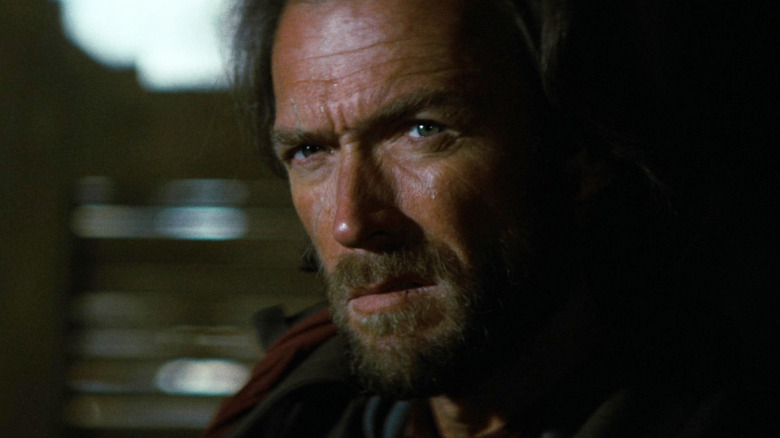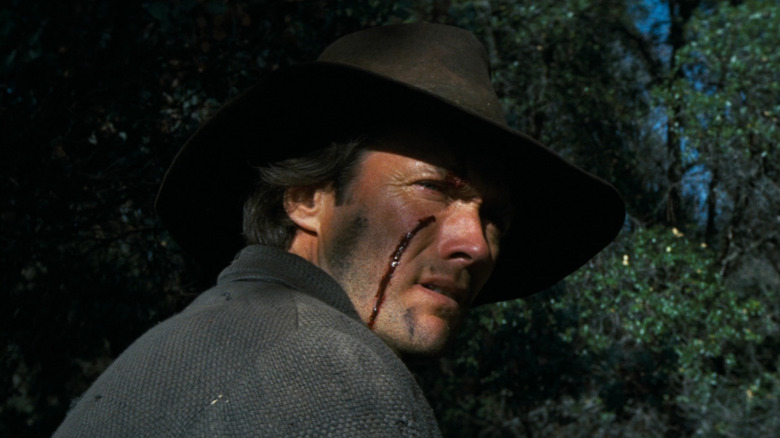Clint Eastwood Felt This Western With 91% On Rotten Tomatoes Was A Career 'High Point'
Clint Eastwood has made all kinds of films throughout his career (even a gothic horror movie via Don Siegel's "The Beguiled"), but there might not be a career at all had he not been introduced to audiences worldwide as a star of Westerns. American television viewers got to know him over eight seasons of CBS' "Rawhide" through his steady portrayal of cowboy Rowdy Yates. When Eastwood got tired of television, he went to Spain to make an unusually violent Western called "A Fistful of Dollars" with Italian director Sergio Leone. The low-budget endeavor caught on first with European moviegoers, but, because the movie was so similar to Akira Kurosawa's "Yojimbo," United Artists waited for the legal issues to get settled before releasing all three chapters of Leone's "Dollars Trilogy" (which also includes "For a Few Dollars More" and "The Good, the Bad and the Ugly") in the United States. Eastwood's laconic, sneering "Man with No Name" was no Rowdy Yates; this man was a stone-cold killer who carried out his deadly business sans complaint or emotion.
Eastwood's arrival coincided with the decline of John Wayne, whose old-fashioned oaters were too staid for increasingly adventurous Baby Boomer moviegoers. The violence and cynicism of Eastwood's Westerns more accurately reflected the troubled state of the world, which allowed the actor to become a genre icon for a new generation.
While it's true that Eastwood would also become closely identified with cop flicks (thanks largely to his series of "Dirty Harry" movies), greenlighting a Western with him in front of the camera (and, typically, behind the camera as well) was a guarantee of box office success. Of the 14 he made (we're not counting his uncredited appearance in the 1956 film "Star in the Dust"), the only miss is his literally tone-deaf performance in the film adaptation of Lerner & Loewe's musical "Paint Your Wagon."
Everyone has their favorite Eastwood Western — it's called "Unforgiven." I'm kidding. Kind of. I'm not alone in considering it one of the greatest films ever made, but lots of people will go to the mat for "The Good, the Bad & the Ugly" and others will fire off their Gatling guns in fierce support of a 1976 Western that Eastwood himself rates quite highly.
Shooting The Outlaw Josey Wales wasn't easy for Eastwood, but he was immensely satisfied with the finished film
"The Outlaw Josey Wales" is one of the all-time great dad movies. Set during the U.S. Civil War, it stars Eastwood as a Missouri farmer turned vengeful Bushwhacker after pro-Union soldiers kill his wife and son. Eastwood is at his bloodthirsty best on camera as the film's protagonist, but at the time of its release, it represented a huge step forward for him. Critics were coming around on him after his directorial debut "Play Misty for Me," but "The Outlaw Josey Wales" felt undeniable. It received mostly positive reviews and prompted the ferociously opinionated Orson Welles to call Eastwood "one of America's finest directors." Looking back on the film for its 1999 DVD release, Eastwood remarked that it was "certainly one of the high points of my career ... in the Western genre of filmmaking."
The film holds a Tomatometer score of 91% on Rotten Tomatoes, and, since its release, it has become one of those movies that fathers pass down to their kids while mom shakes her head in resigned disgust. But while it is incredibly violent and quite mean at times, it does carry an antiwar message — which was certainly not the intent of its source material's racist author, Asa Earl Carter, who, according to the film's first director, Philip Kaufman, was a "crude fascist" with viciously anti-government views.
Yes, the great Kaufman, who made an American classic himself with "The Right Stuff," was initially the helmer of "The Outlaw Josey Wales." Alas, he clashed with Eastwood over the portrayal of the main character and, most offensively, worked too slow for his alacritous star. Given that Eastwood was also the producer, these disagreements led to Kaufman's dismissal — though the manner of the firing and the fact that Eastwood took over the reins led the Directors Guild of America to implement an "Eastwood rule," which prohibits stars and producers from axing a director and personally taking their place.
There is no doubt in my mind that a Kaufman-directed "The Outlaw Josey Wales" would've been a much different movie (one that I likely would've loved), but I think Eastwood effectively conveys that war can turn men into monsters. Despite its detestable origin, Eastwood's "The Outlaw Josey Wales" is a vital movie.

